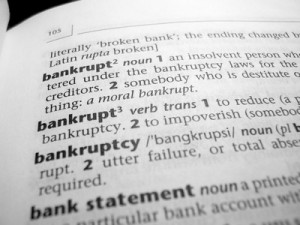 In Chapter 13 bankruptcy cases debtors pay unsecured creditors based upon their disposable income. Disposable income is calculated using a means test. A means test uses the debtor’s average income from the last six months in order to determine the debtor’s current monthly income. Next, the means test calculates the debtor’s deductions. Deductions are expenses likes income tax, health, life, and disability insurance premiums, payments to secured and priority creditors made during the life of the plan, out of pocket medical expenses, etc. Once the total deductions are calculated they are subtracted from the current monthly income and the resulting amount is the debtor’s monthly disposable income. Multiplying the monthly disposable income times sixty in above-median cases and by thirty-six in below-median cases gives the unsecured creditor’s pool.
In Chapter 13 bankruptcy cases debtors pay unsecured creditors based upon their disposable income. Disposable income is calculated using a means test. A means test uses the debtor’s average income from the last six months in order to determine the debtor’s current monthly income. Next, the means test calculates the debtor’s deductions. Deductions are expenses likes income tax, health, life, and disability insurance premiums, payments to secured and priority creditors made during the life of the plan, out of pocket medical expenses, etc. Once the total deductions are calculated they are subtracted from the current monthly income and the resulting amount is the debtor’s monthly disposable income. Multiplying the monthly disposable income times sixty in above-median cases and by thirty-six in below-median cases gives the unsecured creditor’s pool.
The unsecured creditor’s pool is the amount of money the debtor has available over the life of the plan to pay to the unsecured creditors. It may or may not equal how much the debtor will actually have to pay to the unsecured creditors. The amount that will be paid depends on the total claims filed in the case. Sometimes the total unsecured claims listed in the schedules is a lesser amount than the unsecured creditor’s pool. Sometimes the total amount of allowed claims filed by unsecured creditors is lower than the unsecured creditor’s pool. In these cases the debtor may have significant disposable income but not have to devote the entire amount to the unsecured creditors because not all of the disposable income is needed to pay 100% of the creditors. Remember, the unsecured creditor’s pool is the debtor’s ability to pay these creditors and not what he actually has to pay.
The unsecured creditor’s pool can fluctuate during the pendency of the bankruptcy case. Debtor’s who have significant disposable income at the beginning of the case may experience a reduction in income due to loss of job, loss of overtime, or for any other reason that affects income. If the debtor’s income drops then so does his disposable income, which may result in a reduction in his Chapter 13 plan payment.